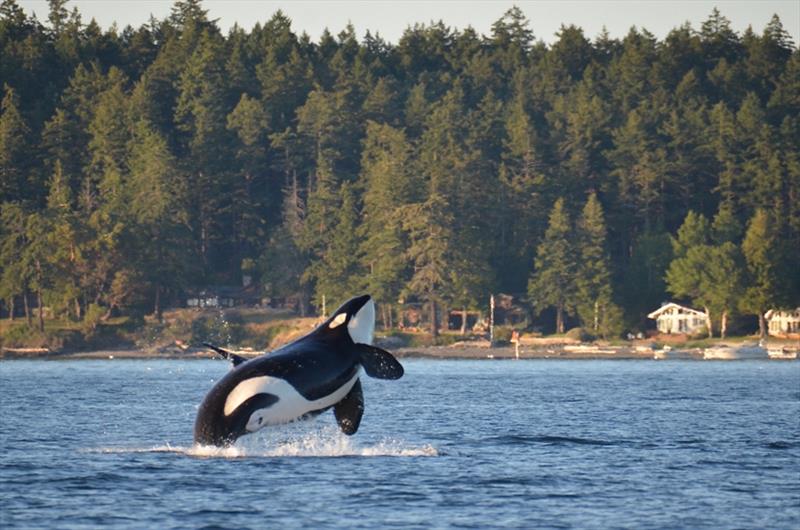
Pacific Northwest celebrates Orca Action Month
by NOAA Fisheries 4 Aug 2019 07:50 UTC

A Southern Resident killer whale breaches in Puget Sound © Monika Wieland Shields
The story of Southern Resident killer whale J35 carrying her dead calf for two weeks last summer attracted worldwide attention, prompting Orca Network to rename June "Orca Action Month," from the former "Orca Awareness Month," signaling the immediate action needed to recover the critically endangered whales.
NOAA Fisheries' West Coast Region applauds the change, and the collaboration between Orca Network and the Orca Salmon Alliance that brought advocates together to take even more action for the Southern Residents.
"Thirteen years ago Orca Network began celebrating Orca Awareness Month in Washington State and had recently expanded to Oregon and British Columbia," said Cindy Hansen, Education and Events Coordinator for Orca Network. "Also adding to this momentum and expansion has been the partnership with the Orca Salmon Alliance for the past several years. This year we decided that since J35 raised so much awareness with her story, we would change the name from Orca Awareness Month to Orca Action Month."
Partners in action
The month rallied support for actions everyone can take to recover the Southern Resident killer whales. For example, Friends of North Creek Forest organized a river restoration party in Bothell, Washington. This work party saw people using shovels to plant native plants and remove invasive species, all to benefit salmon, the primary prey of the Southern Residents.
On June 9, the day after World Oceans Day, Orca Network, Whale Scout, and Whale and Dolphin Conservation led a coordinated beach cleanup at 15 locations in Washington and Oregon. The Seattle Aquarium, Washington State Parks, and Port Townsend Marine Science Center also held Orca Action Month events that educated people about killer whales and called people in the Northwest to action.
"Visitors often ask us what they can do to help save our local orcas," said Nora Nickum, Ocean Policy Advisor for the Seattle Aquarium. "The Seattle Aquarium aspires to turn knowledge into inspiration and provide tangible actions, from things that people can do at home to policies that they can support in the Legislature. We know that our future, the future of our Southern Resident orcas, and the future of the Salish Sea are all inextricably linked.
"Our annual Orca Weekend celebration is an opportunity for visitors to learn more about the orcas, hear from researchers in the field, do fun hands-on activities, and learn about ways we can all help the orcas recover. We are excited to also be joined by many of our Orca Salmon Alliance partners who are doing great work around the region."
What can you do?
Just a few changes in your daily activities and outlook can add up to meaningful action to help the whales and the salmon they eat. For example:
- Prevent toxic runoff into streams and the ocean from car oils and fluids by fixing car leaks.
- Conserving water by watering your lawn less.
- Landscape with native plants to avoid fertilizer and pesticide runoff into streams and the coastal waters.
- Plant native plants and trees along creeks and streams to provide shade and nutrients.
- Boaters and kayakers can follow Be Whale Wise guidelines at org to prevent disturbing the whales when they are foraging and resting.
Check out this page for more groups and volunteer opportunities to help promote recovery of the Southern Residents.
Orca Action Month's official website also remains a resource for people who want to get involved. Even if you missed some events, you can still contact organizations that pursue action throughout the year.
For more ways to help recover Southern Resident killer whales and improve the health of the ocean, follow the links provided. It's not too late to make a difference!
Links: